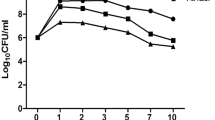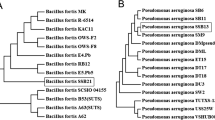Abstract
Rhizobacteria that are helpful to plants can lessen the impacts of salt stress, and they may hold promise for the development of sustainable agriculture in the future. The present study was intended to explicate consortia of salt-tolerant plant-beneficial rhizobacteria for the amelioration of salinity stress in Arabidopsis plants. Inoculation with both the consortia positively influenced the growth of plants as indicated by total chlorophyll content, MDA content, and antioxidant enzyme activities under stressful conditions. Both the multi-trait consortia altered the expression profiles of stress-related genes including CSD1, CAT1, Wrky, Ein, Etr, and ACO. Furthermore, the metabolomic analysis indicated that inoculated plants modulated the metabolic profiles to stimulate physiological and biochemical responses in Arabidopsis plants to mitigate salt stress. Our study affirms that the consortia of salt-tolerant bacterial strains modulate the transcriptional as well as metabolic machinery of plants to protect them from salinity stress. Nevertheless, the findings of this study revealed that consortia are composed of salt-tolerant bacterial strains viz. Bacillus safensis NBRI 12M, B. subtilis NBRI 28B, and B. subtilis NBRI 33N demonstrated significant improvement in Arabidopsis plants under saline stress conditions.





Similar content being viewed by others
References
Hassani A, Azapagic A, Shokri N (2021) Global predictions of primary soil salinization under changing climate in the 21st century. Nat Commun 18:1–7
Kumar A, Singh S, Gaurav AK, Srivastava S, Verma JP (2020) Plant growth-promoting bacteria: biological tools for the mitigation of salinity stress in plants. Front Microbiol 11:1216
Evelin H, Devi TS, Gupta S, Kapoor R (2019) Mitigation of salinity stress in plants by arbuscular mycorrhizal symbiosis: current understanding and new challenges. Front Plant Sci 12(10):470
Ma Y, Dias MCP, Freitas H (2020) Drought and salinity stress responses and microbe-induced tolerance in plants. Front Plant Sci 11:1750
Bisht N, Tiwari S, Singh PC, Niranjan A, Chauhan PS (2019) A multifaceted rhizobacterium Paenibacillus lentimorbus alleviates nutrient deficiency-induced stress in Cicer arietinum L. Microbiol Res 223:110–119
Bisht N, Chauhan PS (2020) Comparing the growth-promoting potential of Paenibacillus lentimorbus and Bacillus amyloliquefaciens in Oryza sativa L. var. Sarju-52 under suboptimal nutrient conditions. Plant Physiol Biochem 146:187–197
Misra S, Chauhan PS (2020) ACC deaminase-producing rhizosphere competent Bacillus spp. mitigate salt stress and promote Zea mays growth by modulating ethylene metabolism. 3 Biotech 10:119
Bisht N, Mishra SK, Chauhan PS (2020) Bacillus amyloliquefaciens inoculation alters physiology of rice (Oryza sativa L. var. IR-36) through modulating carbohydrate metabolism to mitigate stress induced by nutrient starvation. Int J Biol Macromol 143:937–951
Dixit R, Agrawal L, Srivastava S, Chauhan PS (2021) Paenibacillus lentimorbus enhanced abiotic stress tolerance through lateral root formation and phytohormone regulation. J Plant Growth Regul 41:1–12
Isah T (2019) Stress and defense responses in plant secondary metabolites production. Biol Res 52:39
Cheng Z, Park E, Glick BR (2007) 1-Aminocyclopropane-1-carboxylate deaminase from Pseudomonas putida UW4 facilitates the growth of canola in the presence of salt. Can J Microbiol 53:912–918
Chauhan PK, Upadhyay SK, Tripathi M, Singh R, Krishna D, Singh SK, Dwivedi P (2022) Understanding the salinity stress on plant and developing sustainable management strategies mediated salt-tolerant plant growth-promoting rhizobacteria and CRISPR/Cas9. Biotechnol Genet Eng Rev 19:1–37
Mbodj D, Effa-Effa B, Kane A, Manneh B, Gantet P, Laplaze L, Diedhiou AG, Grondin A (2018) Arbuscular mycorrhizal symbiosis in rice: establishment, environmental control and impact on plant growth and resistance to abiotic stresses. Rhizosphere 8:12–26
Bhatia SK, Bhatia RK, Choi YK, Kan E, Kim YG, Yang YH (2018) Biotechnological potential of microbial consortia and future perspectives. Crit Rev Biotechnol 38:1209–1229
Bhatt P, Bhatt K, Sharma A, Zhang W, Mishra S, Chen S (2021) Biotechnological basis of microbial consortia for the removal of pesticides from the environment. Crit Rev Biotechnol 41:317–338
Misra S, Dixit VK, Khan MH, Mishra SK, Dviwedi G, Yadav S, Lehri A, Chauhan PS (2017) Exploitation of agro-climatic environment for selection of 1-aminocyclopropane-1-carboxylic acid (ACC) deaminase producing salt tolerant indigenous plant growth promoting rhizobacteria. Microbiol Res 205:25–34
Sutton MA, Oenema O, Erisman JW, Leip A, van Grinsven H, Winiwarter W (2011) Too much of a good thing. Nature 472:159–161. https://doi.org/10.1080/15592324.2015.1113363
Heath RL, Packer L (1968) Photoperoxidation in isolated chloroplasts. I. Kinetic and stoichiometry of fatty acid peroxidation. Arch Biochem Biophys 125:189
Bradford MM (1976) A rapid and sensitive method for the quantification of microgram quantities of protein utilizing the principle of protein-dye binding. Anal Biochem 72:248–254
Chandlee JM, Scandalios JC (1983) Gene expression during early kernel development in Zea mays. Dev Genet 4:99–115
Nakano Y, Asada K (1981) Hydrogen peroxide is scavenged by Ascorbate specific peroxidase in spinach chloroplasts. Plant Cell Physiol 22:867–880
Livak KJ, Schmittgen TD (2001) Analysis of relative gene expression data using realtime quantitative PCR and the 2 [delta delta C (T)] methods. Methods 25:402–408
Dixit R, Agrawal L, Singh SP, Prateeksha SPC, Prasad V, Chauhan PS (2018) Paenibacillus lentimorbus induces autophagy for protecting tomato from Sclerotium rolfsii infection. Microbiol Res 215:164–174
Srivastava S, Bisht H, Sidhu OP, Srivastava A, Singh PC, Pandey RM, Raj SK, Roy R, Nautiyal CS (2012) Changes in the metabolome and histopathology of Amaranthus hypochondriacus L. in response to Ageratum enation virus infection. Phytochemistry 80:8–16
Bhatia A, Bharti SK, Tewari SK, Sidhu OP, Roy R (2013) Metabolic profiling for studying chemotype variations in Withania somnifera (L.) Dunal fruits using GC–MS and NMR spectroscopy. Phytochemistry 93:105–115
Mustafa G, Akhtar MS, Abdullah R (2019) Global concern for salinity on various agro-ecosystems. In: Akhtar M (ed) Salt stress, microbes, and plant interactions: causes and solution. Springer, Singapore, pp 1–19
Corwin DL (2021) Climate change impacts on soil salinity in agricultural areas. Eur J Soil Sci 72:842–862
Ha-Tran DM, Nguyen TT, Hung SH, Huang E, Huang CC (2021) Roles of plant growth-promoting rhizobacteria (PGPR) in stimulating salinity stress defense in plants: a review. Int J Mol Sci 22:3154
Neshat M, Abbasi A, Hosseinzadeh A, Sarikhani MR, Dadashi Chavan D, Rasoulnia A (2022) Plant growth promoting bacteria (PGPR) induce antioxidant tolerance against salinity stress through biochemical and physiological mechanisms. Physiol Mol Biol Plants 28:347–361
Sapre S, Gontia-Mishra I, Tiwari S (2022) Plant growth-promoting rhizobacteria ameliorates salinity stress in pea (Pisum sativum). J Plant Growth Regul 41:647–656
Redondo-Gómez S, Mesa-Marín J, Pérez-Romero JA, López-Jurado J, García-López JV, Mariscal V, Molina-Heredia FP, Pajuelo E, Rodríguez-Llorente ID, Flowers TJ, Mateos-Naranjo E (2021) Consortia of plant-growth-promoting rhizobacteria isolated from halophytes improve response of eight crops to soil salinization and climate change conditions. Agronomy 11:1609
Kapadia C, Sayyed RZ, El Enshasy HA, Vaidya H, Sharma D, Patel N, Malek RA, Syed A, Elgorban AM, Ahmad K, Zuan AT (2021) Halotolerant microbial consortia for sustainable mitigation of salinity stress, growth promotion, and mineral uptake in tomato plants and soil nutrient enrichment. Sustainability 13:8369
Tsoi R, Dai Z, You L (2019) Emerging strategies for engineering microbial communities. Biotechnol Adv 37:107372
Silambarasan S, Logeswari P, Cornejo P, Kannan VR (2019) Role of plant growth–promoting rhizobacterial consortium in improving the Vigna radiata growth and alleviation of aluminum and drought stresses. Environ Sci Pollut Res 26:27647–27659
Liu JJ, Wei Z, Li JH (2014) Effects of copper on leaf membrane structure and root activity of maize seedling. Bot Stud 55:47
Sachdev S, Ansari SA, Ansari MI, Fujita M, Hasanuzzaman M (2021) Abiotic stress and reactive oxygen species: generation, signaling, and defense mechanisms. Antioxidants 10(2):277
Naseem H, Bano A (2014) Role of plant growth-promoting rhizobacteria and their exopolysaccharide in drought tolerance of maize. J Plant Interact 9:689–701
Mishra IG, Sapre S, Sharma A, Tiwari S (2016) Amelioration of drought tolerance in wheat by the interaction of plant growth-promoting rhizobacteria. Plant Biol 18:992–1000
Tiwari S, Lata C, Chauhan PS, Nautiyal CS (2016) Pseudomonas putida attunes morphophysiological, biochemical and molecular responses in Cicer arietinum L. during drought stress and recovery. Plant Physiol Biochem 99:108–117
Joshi B, Chaudhary A, Singh H, Kumar PA (2020) Prospective evaluation of individual and consortia plant growth promoting rhizobacteria for drought stress amelioration in ice (Oryza sativa L.). Plant Soil 457(1):225–240
Yasin NA, Akram W, Khan WU, Ahmad SR, Ahmad A, Ali A (2018) Halotolerant plant-growth promoting rhizobacteria modulate gene expression and osmolyte production to improve salinity tolerance and growth in Capsicum annum L. Environ Sci Pollut Res 25:23236–23250
Li W, Pang S, Lu Z, Jin B (2020) Function and mechanism of WRKY transcription factors in abiotic stress responses of plants. Plants 9(11):1515
Bharti N, Pandey SS, Barnawal D, Patel VK, Kalra A (2016) Plant growth promoting rhizobacteria Dietzia natronolimnaea modulates the expression of stress responsive genes providing protection of wheat from salinity stress. Sci Rep 6:34768
Riyazuddin R, Verma R, Singh K, Nisha N, Keisham M, Bhati KK, Kim ST, Gupta R (2020) Ethylene: a master regulator of salinity stress tolerance in plants. Biomolecules 10:959
Hu L, Liu J, Zhang W, Wang T, Zhang N, Lee YH, Lu H (2020) Functional metabolomics decipher biochemical functions and associated mechanisms underlie small-molecule metabolism. Mass Spectrom Rev 39(5–6):417–433
Pamuru RR, Puli COR, Pandita D, Wani SH (2021) Sugar alcohols and osmotic stress adaptation in plants. In: Wani SH, Gangola MP, Ramadoss BR (eds) Compatible solutes engineering for crop plants facing climate change. Springer, Cham, pp 189–203
Sakuradani E, Zhao L, Haslam TM, Kunst L (2013) The CER22 gene required for the synthesis of cuticular wax alkanes in Arabidopsis thaliana is allelic to CER1. Planta 237:731–738
Abdullah HM, Rodriguez J, Salacup JM, Castañeda IS, Schnell DJ, Pareek A, Dhankher OP (2021) Increased cuticle waxes by overexpression of WSD1 improves osmotic stress tolerance in Arabidopsis thaliana and Camelina sativa. Int J Mol Sci 22:5173
Aboobucker SI, Suza WP (2019) Why do plants convert sitosterol to stigmasterol? Front Plant Sci 10:354
Khalil R, Tajti J, Hamow KA, Gondor KO, Darko E, Elsayed N, Nagy Z, Szalai G, Janda T, Majlath, (2021) How does moderate drought affect quantum yield and the regulation of sugar metabolism at low temperature in durum wheat (Triticum durum L.)? Photosynthetica 29:313–326
Funding
The authors acknowledge the Director, CSIR National Botanical Research Institute for providing facilities and support during the study. This work is supported by the CSIR-Network (MLP0048 and MLP0049) and an in-house project (OLP109) funded by the Council of Scientific and Industrial Research, New Delhi, India.
Author information
Authors and Affiliations
Contributions
PSC conceived and designed the experiments; RD and SM performed the experiments; SKG performed the GC–MS. RD and NB analyzed the data; RD, NB, and PSC wrote and edited the manuscript.
Corresponding author
Ethics declarations
Competing interest
The authors declare that there is no conflict of interest.
Additional information
Publisher's Note
Springer Nature remains neutral with regard to jurisdictional claims in published maps and institutional affiliations.
Supplementary Information
Below is the link to the electronic supplementary material.
Rights and permissions
Springer Nature or its licensor (e.g. a society or other partner) holds exclusive rights to this article under a publishing agreement with the author(s) or other rightsholder(s); author self-archiving of the accepted manuscript version of this article is solely governed by the terms of such publishing agreement and applicable law.
About this article
Cite this article
Dixit, R., Bisht, N., Misra, S. et al. Bacillus Consortia Modulate Transcriptional and Metabolic Machinery of Arabidopsis Plants for Salt Tolerance. Curr Microbiol 80, 77 (2023). https://doi.org/10.1007/s00284-023-03187-2
Received:
Accepted:
Published:
DOI: https://doi.org/10.1007/s00284-023-03187-2




